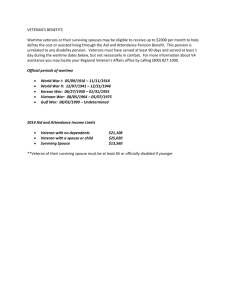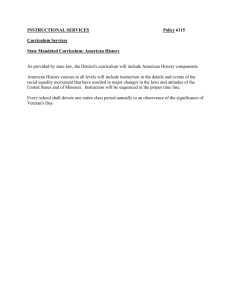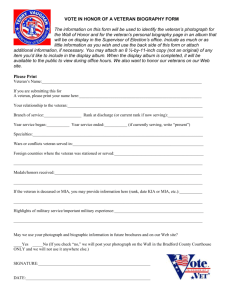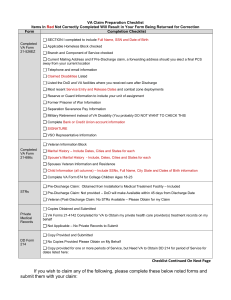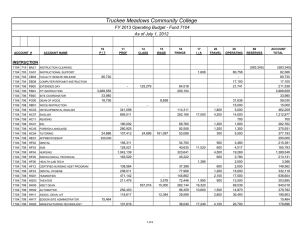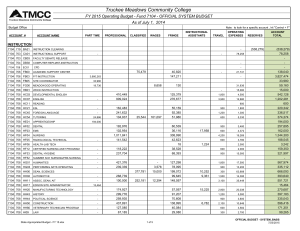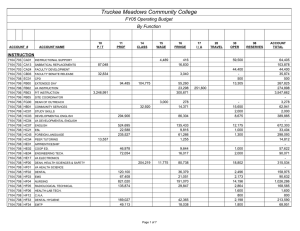2008 Sharp Brief - LegalEase Solutions LLC
advertisement
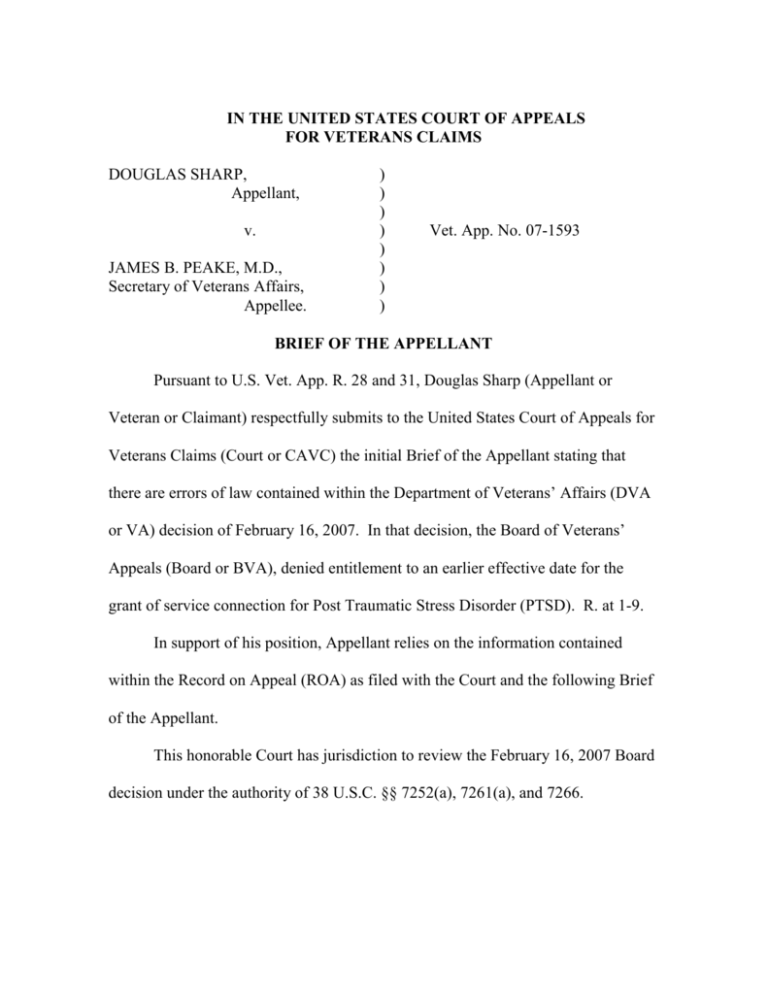
IN THE UNITED STATES COURT OF APPEALS FOR VETERANS CLAIMS DOUGLAS SHARP, Appellant, v. JAMES B. PEAKE, M.D., Secretary of Veterans Affairs, Appellee. ) ) ) ) ) ) ) ) Vet. App. No. 07-1593 BRIEF OF THE APPELLANT Pursuant to U.S. Vet. App. R. 28 and 31, Douglas Sharp (Appellant or Veteran or Claimant) respectfully submits to the United States Court of Appeals for Veterans Claims (Court or CAVC) the initial Brief of the Appellant stating that there are errors of law contained within the Department of Veterans’ Affairs (DVA or VA) decision of February 16, 2007. In that decision, the Board of Veterans’ Appeals (Board or BVA), denied entitlement to an earlier effective date for the grant of service connection for Post Traumatic Stress Disorder (PTSD). R. at 1-9. In support of his position, Appellant relies on the information contained within the Record on Appeal (ROA) as filed with the Court and the following Brief of the Appellant. This honorable Court has jurisdiction to review the February 16, 2007 Board decision under the authority of 38 U.S.C. §§ 7252(a), 7261(a), and 7266. STATEMENT OF THE ISSUE ISSUE: WHETHER THE BOARD DECISION OF FEBRUARY 16, 2007 WAS CLEARLY ERRONEOUS AND UNSUPPORTED BY ADEQUATE REASONS AND BASES STATEMENT OF THE CASE I. Nature of the Case The Veteran appeals a decision by the Board that denied him entitlement to an earlier effective date for the grant of service connection for PTSD at a 100 percent evaluation. R. at 1-9. II. Course and Results of Proceedings Below This appeal arises out of a February 1999 rating decision that granted service connection for PTSD, at a 100 percent evaluation, effective March 26, 1998 (the date of a VA hospital admission). R. at 325-29. The Veteran appealed the effective date of this award and in August 2001 the BVA granted an effective date of February 20, 1998 (date of receipt of the informal claim). R. at 508-19. The Veteran, once again, appealed this decision and filed a claim alleging clear and unmistakable error (CUE) with respect to the 1986 RO denial. R. at 621. The allegation of clear and unmistakable error is not currently in appellate status. The Appellant’s claim for an earlier effective date was directly appealed to this Court and pursuant to a Joint Motion for Remand (R. at 640-46), dated January 2 26, 2005, the claim was returned to the BVA which then, on February 16, 2007, denied entitlement to an effective date earlier than February 20, 1998. R. at 1-9. A timely appeal to this honorable Court followed. III. Statement of the Facts The Veteran served on active duty in the U.S. Army from November 17, 1964 until March 17, 1969, which included a tour in Vietnam as a combat engineer. R. at 13-14. While in Vietnam, the Veteran earned the Vietnam Service Medal with two Bronze Service Stars, the Republic of Vietnam Campaign Medal and the Army Commendation Medal with device for valor. R. at 14. In a rating decision dated March 2, 1972, the VA denied the Veteran’s claim for service connection of a “nervous condition” concluding that “[SMRs] show no evidence of a nervous condition. However, records do show evidence of a character disorder manifested by a sociopathic personality trait.” R. at 113. This decision would become final. The Veteran attempted to reopen his claim from 1972 until the RO finally obliged in 1986 but then denied his claim on the merits. R. at 177-79. This denial was confirmed in March of 1987 (R. at 199) and after a timely Notice of Disagreement (NOD) (R. at 203) VA issued a Statement of the Case in May 1987 (R. at 207-12). The Veteran failed to perfect his appeal and the March 1987 decision also became final. 3 Thereafter, in February 1998, the Veteran filed an informal claim for compensation or pension benefits. R. at 214. In February 1999 the RO granted service connection for PTSD, evaluated as 100 percent disabling, effective March 26, 1998 (the date of a VA hospital admission). R. at 325-29. The Veteran appealed the effective date of this award and in August 2001 the BVA granted an effective date of February 20, 1998 (date of receipt of the informal claim). R. at 508-19. The Veteran, once again, appealed this decision and filed a claim alleging clear and unmistakable error (CUE) with respect to the 1986 RO denial. R. at 621. The allegation of clear and unmistakable error is not currently before the Court. The Appellant’s claim for an earlier effective date was directly appealed to this Court and pursuant to a Joint Motion for Remand, dated January 26, 2005, the Board was instructed to render a decision that fully articulates “reasons or bases for its determinations, in accordance with 38 U.S.C. § 7104 and the Court’s holding in Gilbert v. Derwinski, 1 Vet. App. 49, 56-57 (1990).” R. at 643. Upon remand, the Board looked to 38 U.S.C. § 5110(a) and 38 C.F.R. § 3.400 as justification to conclude that the effective date is properly the date of receipt or the date entitlement arose, whichever is later, and that no exception thereto could be found within the regulations. R. at 7. A timely appeal followed. 4 ARGUMENT Summary The Board’s determination that an effective date of February 20, 1998 is the earliest possible date assignable is clearly erroneous. The Board decision of February 16, 2007 also failed to comply with the reasons and bases requirement of 38 U.S.C. § 7104, this Court’s holding in Gilbert, supra and as stipulated in the 2005 Joint Motion for Remand. The Board has failed to apply all potentially applicable laws and regulations to include 38 U.S.C. § 5110(g) and 38 C.F.R. § 3.157(a). ISSUE: WHETHER THE BOARD DECISION OF FEBRUARY 16, 2007 WAS CLEARLY ERRONEOUS AND UNSUPPORTED BY ADEQUATE REASONS AND BASES. A Board determination of the proper effective date is a finding of fact. See Hanson v. Brown, 9 Vet. App. 29, 32 (1996). The Court reviews findings of fact using the “clearly erroneous” standard of review. See 38 U.S.C. § 7261 (a)(4); and Link v. West, 12 Vet. App. 39 (1998). The Board has a duty “to consider, and discuss in its decision, all ‘potentially applicable’ provisions of law and regulations.” See Schafrath v. Derwinski, 1 Vet.App. 589, 593 (1991); 38 U.S.C. § 7104(a) and (d)(1); and Weaver v. Principi, 14 Vet.App. 301, 302 (2001) (per curiam order). Here, a rating decision, dated November 4, 1986, denied entitlement to service connection for PTSD stating: 5 the totality of evidence in file is quite clear that the veteran has had a long history of a personality disorder characterized by his inability to relate [to] authority figures, and of his inability to control his temper. There is no evidence in file to indicate that the veteran experienced a recognizable stressor that would be expected to evoke significant symptoms in almost all individuals, nor does the veteran present a history of reexperiencing the “trauma” by recurrent dreams of the event. R. at 178. A Change in Law A March 1987 rating decision continued this denial and the Veteran failed to perfect an appeal. R. at 199. The VA amended its regulations in 1996 as they pertain to evaluating mental disorders and specifically incorporated the criteria set forth in the Diagnostic and Statistical Manual of Mental Disorders (Fourth Edition) (DSM-IV). See 61 Fed.Reg. 52,695 (Oct. 8, 1996), 60 Fed.Reg. 54,826 (Oct. 26, 1995); see also Cohen v. Brown, 10 Vet.App. 128, 138-39 (1997). This Court, in Cohen, states “[u]nder DSM-IV, there is no longer the requirement that the stressor be ‘outside the range of usual human experience’ and be ‘markedly distressing to almost anyone’. . . . DSM-IV instead requires that the person’s response to the stressor involve intense fear, helplessness, or horror’.” Cohen at 141. Clearly, the basis for the denial of the Veteran’s claim in 1987 was that he failed to exhibit a “recognizable stressor that would be expected to evoke significant symptoms in almost all individuals.” R. at 178. Similarly clear is the fact that the RO used the criteria set forth in the DSM-III to evaluate the Veteran’s claim of PTSD. 6 In February 1998, the Veteran was admitted to a VA medical facility evidencing symptoms of “possible PTSD.” R. at 242-46. A May 22, 1998 C&P examination confirmed the diagnosis of PTSD and in a rating decision, dated February 1999 the RO granted service connection for PTSD, evaluated as 100 percent disabling, effective March 26, 1998 (the date of a VA hospital admission). R. at 325-29. In rendering its decision, the RO specifically states that the Veteran “is now found to have met all requirements for service connection for post traumatic stress disorder.” R. at 326. Specifically, the RO determined that “in addition to a clear diagnosis of the condition, there must be evidence that the veteran was [sic] experienced a stressful event that served to trigger the disease.” Id. The RO then stated the “evidenced is found to support the occurrence of a stressor.” Id. Following this grant of service connection, the Veteran appealed the effective date of the award and in August 2001 the BVA granted an effective date of February 20, 1998 (date of receipt of the informal claim). R. at 508-19. The Veteran continues to disagree with the effective date assigned because the Board has failed to recognize the exception created by 38 U.S.C. § 5110(g) or 38 C.F.R. § 3.157(a). Moreover, the Board’s most recent decision fails to discuss these provisions in spite of their potential applicability. The diagnostic criteria under which the Veteran’s PTSD is rated changed when the VA adopted the DSM-IV criteria for rating all mental disorders in 1996. 7 Prior to that date, a stressor was only found to be sufficient to yield a diagnosis of PTSD if that stressor “would evoke significant symptoms of distress in almost everyone.” Cohen at 141. The VA has previously addressed the issue of the acceptance of diagnosis for mental disorders conforming to DSM-IV versus that of DSM-III, and noted that DSM-IV “would not only modify the evidentiary obligations imposed on claimants under current regulations, but could alter the outcome of claims.” See VAOPGCPREC 10-95 at 2, para. 4 (acceptance of a diagnosis of a mental disorder conforming to the fourth edition of the American Psychiatric Association’s Diagnostic and Statistical Manual of Mental Disorders (DSM), rather than the third edition (DSM-III). In view of the foregoing, the VA’s adoption of the DSM-IV criteria, which modified the evidentiary standards for proving a stressor sufficient to render a diagnosis of PTSD, should represent a “liberalizing VA issue” effective prior to the Veteran’s informal claim for benefits. The Board failed to discuss the application of this relevant section of the law. The Board had a duty to discuss this change in the rating criteria. Specifically, the Board should have discussed 38 U.S.C. § 5110(g), which provides: Subject to the provisions of section 5101 of this title [38 USCS § 5101], where compensation, dependency and indemnity compensation, or pension is awarded or increased pursuant to any Act or administrative issue, the effective date of such award or increase shall be fixed in accordance with the facts found but shall not be earlier than the effective date of the Act or administrative issue. In no event shall such award or increase be retroactive for 8 more than one year from the date of application therefor or the date of administrative determination of entitlement, whichever is earlier. 38 U.S.C. § 5110(g) (emphasis added). The Board wholly failed to discuss the fact that the VA changed the requirements for rating mental disorders and the effective date of that change predated the Veteran’s informal claim. It is patently clear that the RO granted service connection for the Veteran’s PTSD based on that change in the law but erroneously assigned an effective date that corresponded only to the date the Veteran filed his informal claim thereto. Under § 5110(g), the Veteran is entitled to the benefit of the change in the law up to one year prior to the date he filed his informal claim. Therefore, the effective date of the Veteran’s grant of service connection for PTSD should be February 20, 1997 instead of February 20, 1998. In the alternative, similar analysis of 38 C.F.R. § 3.157(a), shows that an earlier effective date may be assigned under that provision. The Board failed to discuss this possibility as well. Specifically, 38 C.F.R. § 3.157(a) provides: Acceptance of a report of examination or treatment as a claim to reopen is subject to the requirements of 3.114 with respect to actions on Department of Veterans Affairs initiative or at the request of the claimant and the payments of retroactive benefits from the date of the report or for a period of 1 year prior to the date of receipt of the report. 38 C.F.R. § 3.157(a). 9 Section 3.157(a) permits a claimant to be awarded retroactive benefits “for a period of 1 year prior to the date of receipt of the report.” The VAMC hospitalization report was dated June 29, 1998 and reportedly was received by the VARO in July 1998. That being the case, the Veteran could be assigned an effective date of July 1997, one year prior to receipt of the hospital report. The assignment by the Board of an earlier effective date of February 20, 1998 was in error. Duty to Assist Notwithstanding the above arguments, the Board made additional remandable error in this case by not ensuring the VA fulfilled its duty to assist this Veteran. Specifically, in the Joint motion for Remand, dated January 26, 2005, the Board was instructed to render a decision that fully articulates “reasons or bases for its determinations, in accordance with 38 U.S.C. § 7104 and the Court’s holding in Gilbert v. Derwinski, 1 Vet. App. 49, 56-57 (1990).” R. at 643. In Stegall, this Court held that “a remand by this Court or the Board confers on the veteran or other claimant, as a matter of law, the right to compliance with the remand orders.” Stegall v. West, 11 Vet.App. 268, 271 (1998) (emphasis added); cf. Dyment v. West, 13 Vet.App. 141, 146-47 (1999) (no Stegall violation when examiner “more than substantially complied with the Board’s remand order”). Here, the Board’s reasons and bases are devoid of any discussion of 38 10 U.S.C. § 5110(g) or 38 C.F.R. § 3.157(a) which are clearly “potentially applicable” provisions of law and regulation. Conclusion As a consequence of the foregoing, the Board violated 38 U.S.C. § 7104 in its de novo review of this case and further failed to provide adequate reasons or bases for its conclusion thereby necessitating a remand for readjudication consistent with all “potentially applicable” provisions of law and regulation. Respectfully submitted, ______________________ Judy J. Donegan Legal Help for Veterans, PLLC Attorney for Appellant 41700 W. Six Mile Rd., Ste. #101 Northville MI 48167 (248) 380-0128 11 CERTIFICATE OF SERVICE On April 18, 2008, a copy of the foregoing was mailed via the U.S. Postal Service with postage prepaid and properly addressed to the U.S. Court of Appeals for Veterans Claims with a copy being also submitted in the same manner and on the same date to: Office of the General Counsel (027E) Attn.: Ralph G. Stiehm, Esquire U.S. Dept. of Veterans Affairs 810 Vermont Avenue Washington, D.C. 20420 I certify under penalty of perjury under the laws of the Unites States of America that the foregoing is true and correct. ________________________________ Judy J. Donegan Attorney at Law 12
